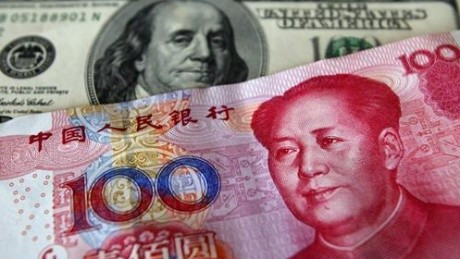China weakness supports dollar, won down despite strong Korea data

China's GDP growth matched market expectations on the year-on-year measure but the quarterly growth trailed and also the industrial output and retail sales data, increasing the safe haven flows to the dollar on Wednesday.
The greenback that fell on Tuesday on disappointing US retail sales numbers found support the next day in Asia after the much awaited Chinese numbers. Asian markets stumbled on Chinese cues and even a better than expected unemployment data failed to arrest the slide of the South Korean won.
The USD index rebounded to 99.05 from the previous close of 98.75, further distancing from Tuesday's intra-day low of 98.37, which was a three-day low. The index had ended the previous session 0.77% down, falling off the near-one-month high of 99.99 touched on Monday.
The Chinese economy expanded 7% from a year earlier in the first quarter of this year, slowing from the 7.3% growth in Q4-2014, but in line with expectations. The sequential growth rate, however, dropped more than expected to 1.3% from 1.5% as the consensus was for 1.4% growth.
Separate releases showed China's industrial output growth dropped to 5.6% from a year earlier in March from 6.8% in February while the market had been expecting a rise to 6.9%. Similarly, retail sales growth slowed to 10.2% from 10.7% against the consensus of an increase to 10.9%.
Meanwhile, urban investment growth in the world's second largest economy slowed to 13.5% year-on-year in March from 13.9% in February when the consensus was for a marginal drop to 13.8%.
Investors said the Chinese data underpin the need for further policy stimulus by authorities and such an optimism will help support Asian assets broadly.
The Australian dollar traded down on Wednesday but it remained supported just above the 6-year low touched earlier this month, despite falling consumer confidence in the home as well.
AUD/USD dropped to 0.7579 from the previous close of 0.7625 but still holding above the 2 April low of 0.7533, which was its lowest since May 2009.
The Westpac consumer confidence index for April was 96.2 down from March's 99.5, as per data earlier in Wednesday. The March job market numbers are the next important Australian numbers, scheduled for Thursday.
South Korea's unemployment rate fell to 3.7% as of March from 3.9% in the previous month data showed on Wednesday. The USD/KRW pair, however, rose to 1098.90 from 1092.06, reversing much of Tuesday's losses triggered by the US dollar slide.
The most important events from the US this week are yet to happen, the release of the March consumer price inflation and April consumer confidence indicator by Reuters/Michigan, both due on Friday. On Thursday, the weekly job market numbers and March housing market data will be in focus.
The monetary policy decision by the European Central Bank and the press conference by its chief Mario Draghi are the most watched events for the rest of Wednesday.
© Copyright IBTimes 2025. All rights reserved.






















